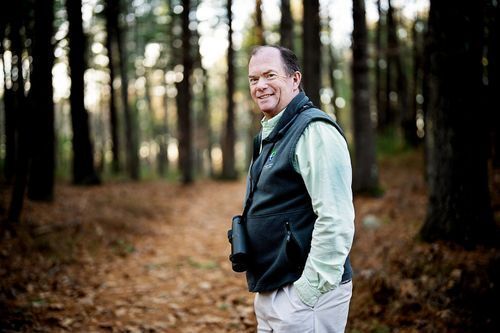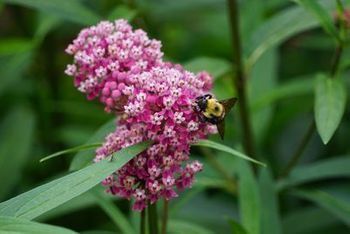Published October 26, 2023
Letter from the Executive Director
Audubon's 2024 Strategic Goals: Accessibility, Biodiversity and Climate Resiliency

Dear Audubon Society of Rhode Island Membership,
I am honored, as the new Executive Director, to take this opportunity to reflect on the remarkable year that has passed and to share with you our ambitious goals for the year ahead.
The Audubon Society of Rhode Island achieved numerous milestones in 2023, but none more important than in our Avian Research Initiative. This year was truly the "Year of the Birds," reigniting our focus on the protection of birds and their habitats. Our organization made significant strides in unraveling the mysteries of the birds that call Rhode Island home, as well as those that migrate through our region. At our inaugural Avian Conservation Symposium, held in January 2023, it was noted that this work has positioned Audubon at the forefront of avian research in New England.
Yet, our focus extended beyond the realm of birds. Audubon recognizes the pressing issue of climate-induced rainstorms and flash floods and our leadership at the Stormwater Innovation Center in Providence has been key in developing nature-based solutions for climate resiliency. Our goal is to slow stormwater runoff, remove contaminants, and return rainwater to its source as cleanly as possible, all through the use of green infrastructure. It is high time that we turn to nature to protect nature.
Insects, particularly pollinators, are also in dire need of protection. The decline in insect populations is a critical issue that affects not only the ecosystem but also the birds that depend on them. Audubon is committed to restoring native species to our refuges by removing invasive plants and creating native, pollinator-friendly habitats. The Palmieri Pollinator Garden, located at the Audubon McIntosh Wildlife Refuge in Bristol, serves as a living laboratory to study and support pollinator health. We have also collaborated with partners at the Bristol Veterans Home, Roger Williams Park, and others to expand pollinator-friendly habitats.
This year, we intensified our efforts to improve our public wildlife refuges, which are the heart of our conservation work. Our advocacy efforts also led to a significant victory in forest protection through the enactment of a new solar siting law. This achievement underscores the power of collective action and partnerships, as well as the unwavering commitment of our members and supporters to preserve our state's precious forests.
As an organization dedicated to inclusivity, Audubon believes everyone should have access to nature. In 2023 Audubon educators introduced an accessible, nature-based programming initiative that is inclusive to all learners.
So, where do we go from here? We have outlined major areas of focus for 2024: Accessibility, Biodiversity, and Climate Resiliency.
Accessibility is a core commitment for the organization. A 2024 initiative will make Audubon facilities easier to access for all. That means improved and bilingual signage and maps at Audubon wildlife refuges, additional benches, and more accessible trails to lower the barriers of getting people outside and engaging with nature. We are installing new auto-opening doors at the Nature Center and Aquarium through a grant from the Christopher & Dana Reeve Foundation and resources at the Audubon Caratunk Wildlife Refuge will become a hub for environmental outreach in Pawtucket, Central Falls, and Providence, ensuring that nature is within reach for all Rhode Islanders.
Biodiversity remains a priority, involving avian research, pollinator habitat conservation, and advocating for the ban of neonicotinoid pesticides. We will continue our efforts in pollinator conservation, including the creation of a pesticide-free pathway of native flowering plants known as the "Butterfly Highway." We need to take action to protect our pollinators and, by extension, our ecosystems.

Our forests are facing numerous challenges, from insect infestations to the spread of solar farms. While we understand the need for increased solar power, we must prioritize installations on already disturbed sites, such as parking lots and rooftops, to avoid encroaching on critical forest land.
Audubon and our partners are determined to protect our most vital forests from development and fragmentation. We are working on habitat management plans and acquiring land to permanently protect these natural areas. We are set to close on the third-largest property in Audubon's history, encompassing over 300 acres, with plans to acquire an additional 100-plus acres in the coming year.
Stormwater management is vital for climate resiliency. The Stormwater Innovation Center, with leadership from Audubon, is working to implement green infrastructure solutions across the state. We are collaborating with experts to address issues such as cyanobacteria outbreaks and to create more sustainable landscapes. Audubon also leads efforts to transform landscapes and promote healthy, vibrant habitats for wildlife in yards and communities across Rhode Island. We will host a full-day symposium in April on transforming landscapes using native plants, and promoting healthy, vibrant habitats in your yard and community.
I would like to express my gratitude to Audubon’s dedicated staff. Their unwavering commitment and tireless efforts make our growth and success possible. A special thanks also is extended to the Audubon board members for their active participation and leadership in the past year.
I also express my deepest appreciation for the unwavering support of our members and supporters. You make our achievements possible, and we depend on you like nature depends on Audubon. Our commitment to conservation, accessibility, biodiversity, and sustainability demands resources, and your continued support is invaluable. Whether you contribute your time, financial support, include Audubon in your will and estate plans, or join our advocacy efforts, your contributions are the lifeblood of our organization and the driving force behind our accomplishments.As we face growing challenges, it is imperative that we seek more funds and greater support. We must dig deeper, be more creative, and diversify our funding streams to ensure the success of our mission.
I’m filled with optimism about the future of Audubon. I look forward to working hand-in-hand with you to make our shared vision of a greener Rhode Island a reality.
Together, we can conquer obstacles, preserve the natural world, and build a brighter and more sustainable future for all. If, and only if, we do it together.
Jeffrey C Hall
Executive Director

















